Unit10 Section A(课件)2023-2024学年人教版八年级英语下册
文档属性
| 名称 | Unit10 Section A(课件)2023-2024学年人教版八年级英语下册 |

|
|
| 格式 | pptx | ||
| 文件大小 | 43.4MB | ||
| 资源类型 | 试卷 | ||
| 版本资源 | 人教新目标(Go for it)版 | ||
| 科目 | 英语 | ||
| 更新时间 | 2024-04-23 09:44:27 | ||
图片预览

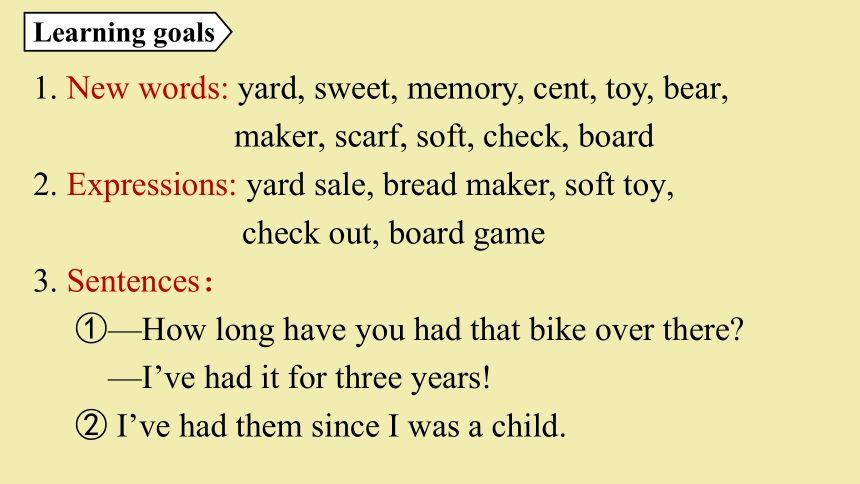
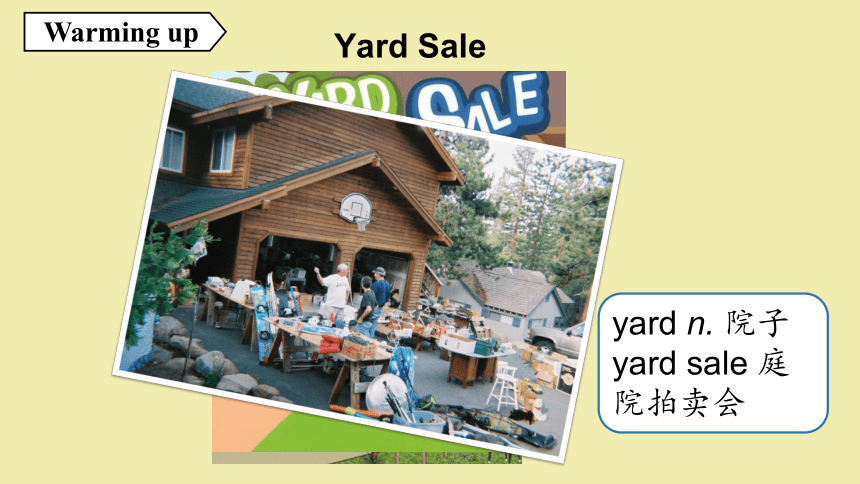
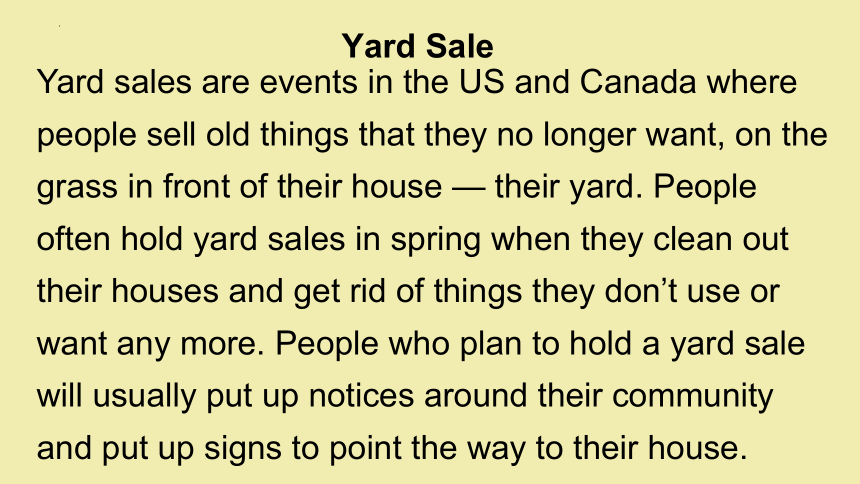
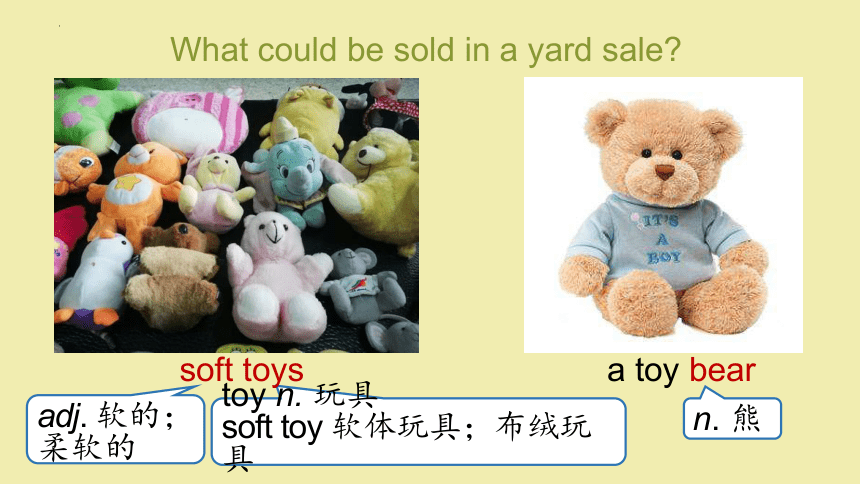
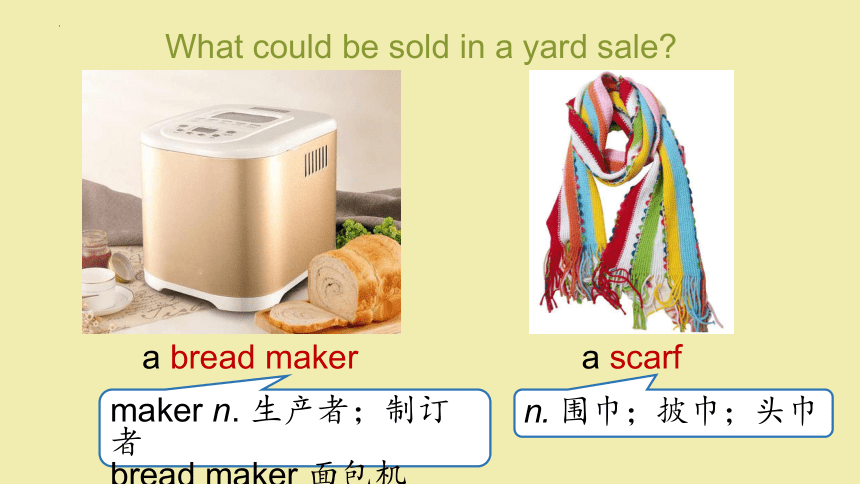
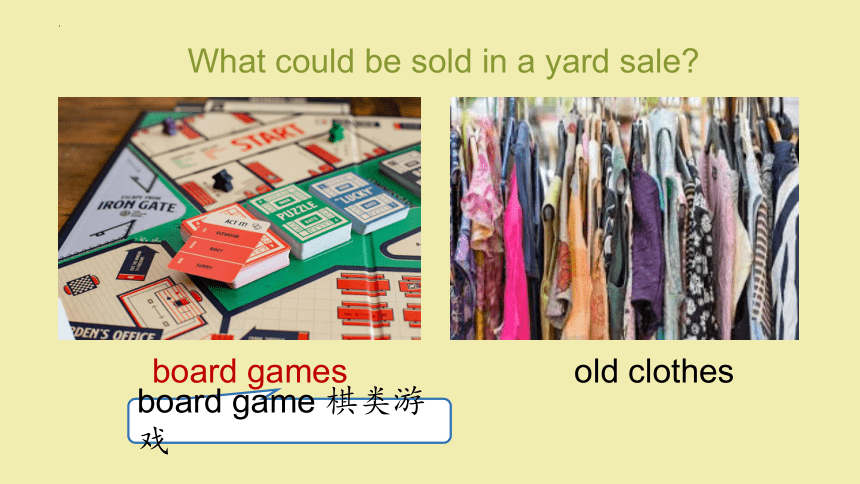
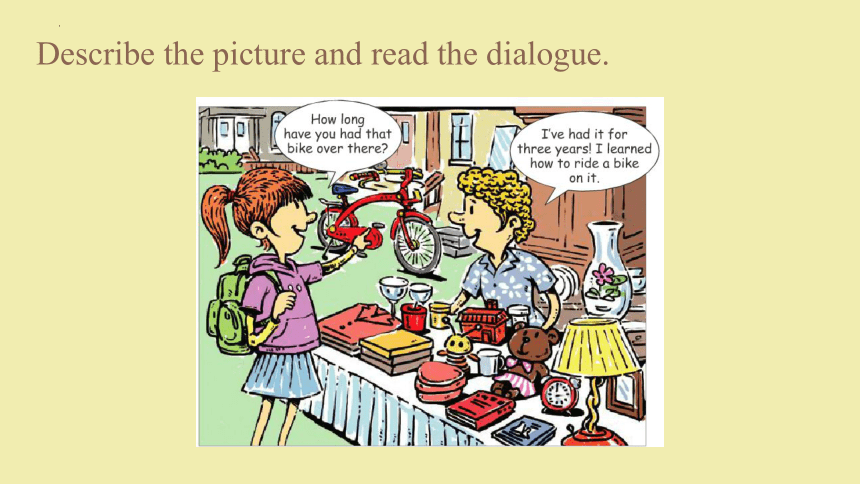
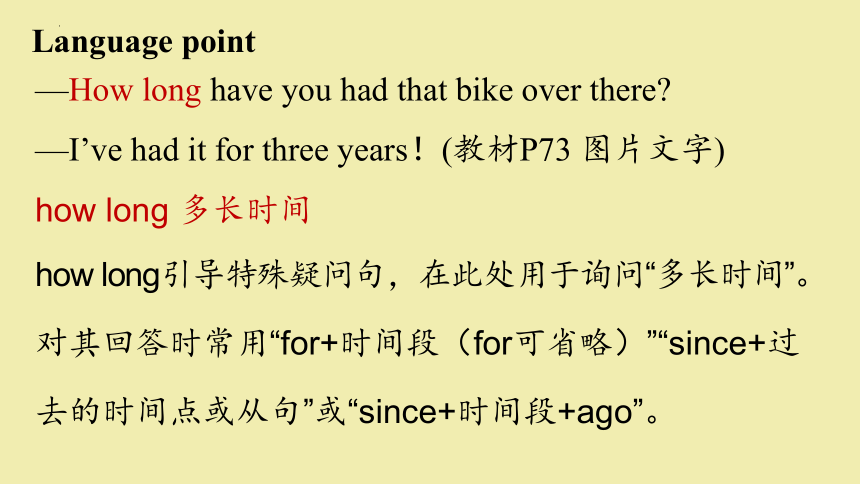
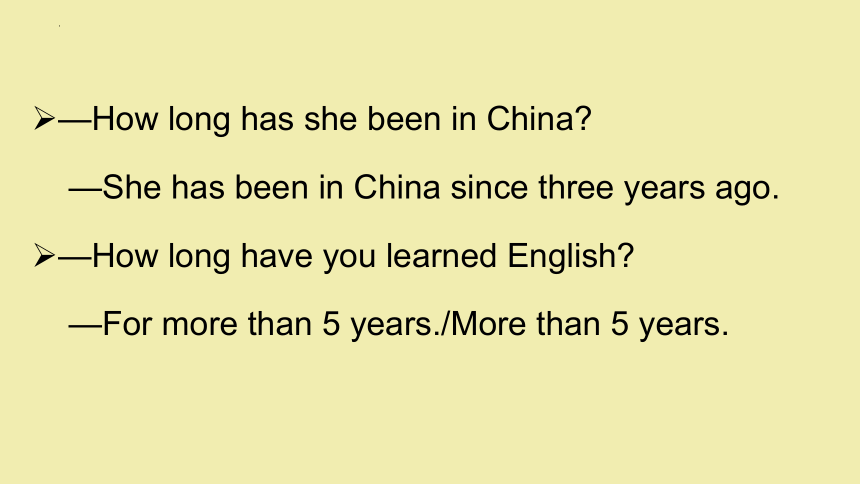
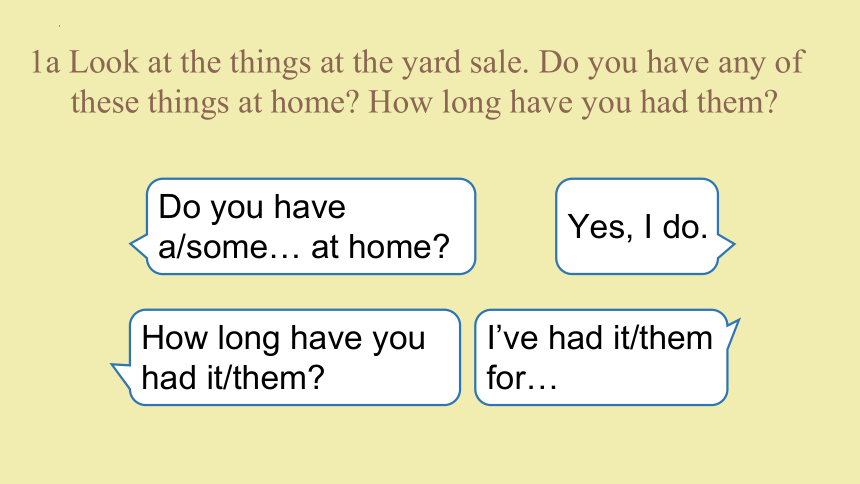
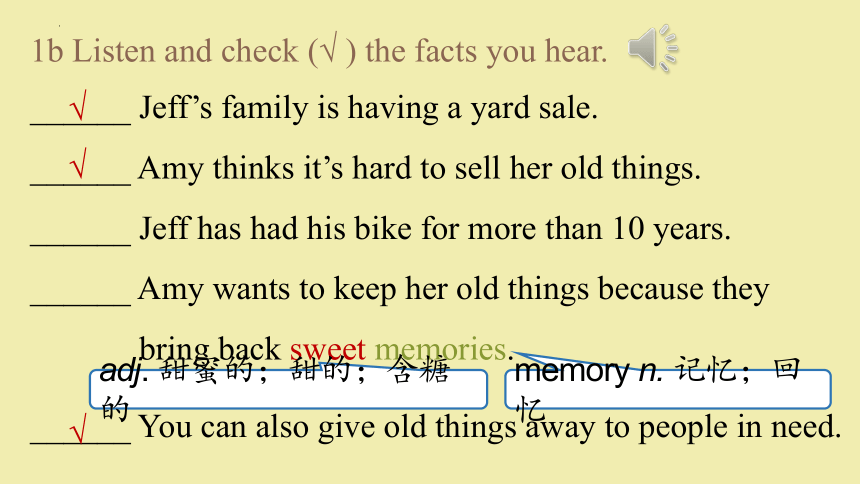
文档简介
(共103张PPT)
初中英语人教版八年级下册
SectionA1a-2d
Unit10 I’ve had this bike for three years
1. New words: yard, sweet, memory, cent, toy, bear,
maker, scarf, soft, check, board
2. Expressions: yard sale, bread maker, soft toy,
check out, board game
3. Sentences:
①—How long have you had that bike over there
—I’ve had it for three years!
② I’ve had them since I was a child.
Learning goals
yard n. 院子
yard sale 庭院拍卖会
Yard Sale
Warming up
Yard sales are events in the US and Canada where people sell old things that they no longer want, on the grass in front of their house — their yard. People often hold yard sales in spring when they clean out their houses and get rid of things they don’t use or want any more. People who plan to hold a yard sale will usually put up notices around their community and put up signs to point the way to their house.
Yard Sale
What could be sold in a yard sale
adj. 软的;柔软的
n. 熊
toy n. 玩具
soft toy 软体玩具;布绒玩具
soft toys
a toy bear
What could be sold in a yard sale
a bread maker
a scarf
maker n. 生产者;制订者
bread maker 面包机
n. 围巾;披巾;头巾
What could be sold in a yard sale
old clothes
board games
board game 棋类游戏
Describe the picture and read the dialogue.
—How long have you had that bike over there
—I’ve had it for three years!(教材P73 图片文字)
how long 多长时间
Language point
how long引导特殊疑问句,在此处用于询问“多长时间”。对其回答时常用“for+时间段(for可省略)”“since+过去的时间点或从句”或“since+时间段+ago”。
—How long has she been in China
—She has been in China since three years ago.
—How long have you learned English
—For more than 5 years./More than 5 years.
1a Look at the things at the yard sale. Do you have any of
these things at home How long have you had them
Do you have a/some… at home
Yes, I do.
How long have you had it/them
I’ve had it/them for…
1b Listen and check (√ ) the facts you hear.
______ Jeff’s family is having a yard sale.
______ Amy thinks it’s hard to sell her old things.
______ Jeff has had his bike for more than 10 years.
______ Amy wants to keep her old things because they
bring back sweet memories.
______ You can also give old things away to people in need.
√
√
√
adj. 甜蜜的;甜的;含糖的
memory n. 记忆;回忆
Listen and answer the questions.
What’s the relationship between Amy and Jeff
What things did Amy ask about
Seller and buyer.
The bike and book.
Listen and read.
Amy: You have some great things at this yard sale, Jeff.
Jeff: Thanks, Amy. Our family has collected so many
things over the years, but we don’t use them anymore.
Amy: But isn’t it hard to sell some of your things There
are many things I’ve had since I was a child. I don’t
think I could sell them.
Jeff: Yes, it’s hard to say goodbye to certain things.
Amy: By the way, how long have you had that bike over there
Jeff: I’ve had it for three years! I learned how to ride a bike on it.
Amy: Old things really bring back sweet memories. But it’s
true that we may never use some of these things again.
Jeff: Yes, like old toys or books you’ve already read. You
can sell those, or you can also give them away to kids
or people who need them.
Amy: Oh! How much is this book
Jeff: You can have it for 75 cents.
cent n. 分;分币
1. Amy wants to keep her old things because they bring back sweet memories. (教材P73 1b)
memory 在此处作可数名词,其复数形式为 memories。
What is your earliest memory
【拓展】(1) memory作名词, 还可意为“记忆力”。
I have a bad memory.
(2) memorize作动词,意为“记忆,记住”。
My Chinese teacher asked me to memorize the poem.
memory / mem ri/ n. 记忆;回忆
Language points
in need 意为“贫困;在困境中”,为固定短语。people in need“困境中的人”,in need of 意为“需要……”。
We are collecting money for children in need.
A friend in need is a friend indeed.
After working for twelve hours, she was in great need of
a rest.
in need 贫困;在困境中
2. You can also give old things away to people in need.
(教材 P73 1b)
【拓展】
in+名词
in trouble
在困境中
in silence
沉默地
in danger
在危险中
in order
井然有序
1c Practice the conversation. Then make conversations
about other things in the picture above.
A: This is a really old book.
B: Yes, I’ve had it for seven years.
I’ve read it three times.
A: Why are you selling it
B: Because I don’t read it anymore.
A: How much is it
B: You can have it for 75 cents.
book
magazine
sweater
toy lion
toy tiger
hat
dress
board game
toy bear
scarf
bread maker
● Do you have...
● How long have you had it
● Which one will you give away
Why
● Which one will you keep Why
Discuss the items in 2a.
2a Listen and check (√ ) the things Amy’s family are
giving away and circle the things they are keeping.
book magazine toy bear toy lion toy tiger
bread maker sweater dress hat scarf
√
√
√
√
√
√
Read and try to predict the answers.
1. Amy has had her favorite ___________ for three years.
2. Amy has had the toy ___________ since she was a
___________ .
3. Amy’s mom has had the old bread maker for more than
___________ years.
4. Amy can give away the ___________ and ___________
because they do not fit her anymore.
物品
物品
物品
物品
数字
2b Listen again and fill in the blanks.
1. Amy has had her favorite ___________ for three years.
2. Amy has had the toy ___________ since she was a
___________ .
3. Amy’s mom has had the old bread maker for more than
___________ years.
4. Amy can give away the ___________ and ___________
because they do not fit her anymore.
book
dress
sweater
baby
bear
ten
Listen and read.
Mom: Let’s look through this box of old things and decide
what to give away.
Amy: I think I want to keep this book. I’ve had it for three years.
Even though I’ve already read it twice, it’s still my
favorite book. But we can give away the magazine.
Mom: What about these soft toys
Amy: I want to keep the bear because I’ve had it since I
was a baby. It has special meaning to me because
Grandma gave it to me. I’ll give away the lion and tiger.
Mom: OK. And this old bread maker of mine can go, too.
I’ve had it for more than 10 years. Aunt Taylor
bought a new one for me last week.
Amy: That’s great. We can still have homemade bread.
And I can give away this sweater and dress, too.
They don’t fit me anymore. But I want to keep the
hat and scarf for ice skating.
Mom: Great. You can take these things to the children’s
home tomorrow then.
● I’ve had it for three years.
● I want to keep the bear because I’ve had it since I
was a baby.
● I’ve had it for more than 10 years.
Key Sentences
Make sentences like these key sentences.
2c Student A is Amy’s mom. Student B is Amy. Make
conversations.
A: Amy, can we give away these soft toys
B: Mom, I want to keep the bear.
A: Why It’s so old.
B: Because I’ve had it since I was a baby.
If you are unable to remember the reasons why Amy is willing or unwilling to give away an item, you can make up your own reasons, as long as the reasons are logical or believable.
Imagine that the class are going to visit the Children’s Home and give away some things of our own. What will you give Why Discuss with your partner and fill in the table.
Name What to give away How long Why
Read the conversation in 2d and answer the questions.
● What does Amy want to do
● What things has Amy brought
● How long has Amy or her mom had them
Linda: Welcome to the Sunshine Home for Children. I’m Linda.
Amy: Hi, I’m Amy. I have some things for the kids. I’ve
had this magazine for a couple of months. The stories
inside may be a bit old, but they’re still interesting.
Linda: Great! Many children here love reading.
2d Role-play the conversation
Amy: And check out these soft toys and board games for
younger kids. I’ve had them since I was a child.
There’s also a sweater and a dress.
Linda: Perfect! We always need toys and clothes.
Amy: One last thing is a bread maker. My mom’s had it
for a long time but it still works.
Linda: Thanks so much!
check v.&n.检查;审查 check out 察看;观察
1. Amy, can we give away these soft toys (教材P74 2c)
soft 作形容词,在此处意为“软的;柔软的”,反义词为 hard“坚硬的”。
It is very relaxing for me to lie on a soft sofa after a
long time study.
soft /s ft/ ,/s ft/ adj. 软的;柔软的
Language points
【拓展】soft 的其他常见含义:
soft
(声音或音乐)轻柔的
(颜色或灯光)柔和的
不含酒精成分的
soft music
soft drink
soft light
2. And check out these soft toys and board games for younger kids. (教材P74 2d)
check out 为“动词 + 副词”型短语,若代词作其宾语,要放在 check 与 out 之间。该短语中 check 作动词,意为“检查;审查”。
Maybe we should go to the library and check it out.
check out 察看;观察
【拓展】(1) check out 还有“结账离开”的意思,其反义短语为check in,意为“(在旅馆、机场等)登记,报到”。
—What time should we check out
—By 2 p.m.
We’ve checked in at the hotel.
(2) check还可作名词,意为“检查;审查”。
Could you give the tyres a check
Fill in the blanks after reading the conversation in 2d.
Linda: Welcome to the Sunshine Home for Children. I’m Linda.
Amy: Hi, I’m Amy. I have some things for the kids. I’ve
had this magazine for months. The
stories inside may be__________, but they’re still
interesting.
Linda: Great! Many children here love reading.
a couple of
a bit old
Amy: And these soft toys and board games for
.I’ve had them I was a child. There’s also a sweater and a dress.
Linda: ! We always need toys and clothes.
Amy: One last thing is . My mom’s had it
but it still works.
Linda: Thanks so much!
Perfect
a bread maker
for a long time
check out
younger kids
since
Key words
Useful expressions
yard sale, bread maker, soft toy, check out, board game
Sentences
yard, sweet, memory, cent, toy, bear, maker, scarf, soft, check, board
①—How long have you had that bike over there
—I’ve had it for three years!
②I’ve had them since I was a child.
Summary
初中英语人教版八年级下册
SectionA 3a-3c
Unit10 I’ve had this bike for three years
1. New words: junior, clear, bedroom, own, railway, part,
certain, honest, while, truthful
2. Expressions: junior high school, clear out, no longer,
part with, as for, to be honest
Learning goals
“Everybody loves a bargain(n.减价品;便宜货)" is
a well-known saying. A bargain is a good deal. It is something you get for less than its value. One person’s useless, ugly, or broken object can be another person’s bargain. That is why so many Americans do not throw things away. They put them outside their house. They
Warming up
Yard Sales
put on a "For Sale" sign. And, as simple as that, they have a yard sale.
In some parts of the country, such a sale might be called a garage sale or a moving sale. Whatever the name, the activity is the same. People sell things they no longer want.
A Vlog about Yard Sales
● When do people usually have yard sales
● Why are the sales called “yard sales”
● What kinds of things do people sell at a yard sale
● Why do people like to buy things at a yard sale
Race to answer
3a Read the article written by a father for a newspaper.
What is his family going to sell at the yard sale
My children are growing up fast. My daughter is 16
and my boy is already in junior high school. As they
get bigger, our house seems to get smaller. So we
want to sell some of our things in a yard sale and give the money to a children’s home.
We have already cleared out a lot of things from our bedrooms.
We have decided to each sell five things that we no longer use. My son was quite sad at first. Although he has not played with his old toys for a long time, he still wanted to keep them. For example, he has owned a train and railway set since his fourth birthday, and he played with it almost every week until he was about seven. And he did not want to lose his toy monkey, either. He slept next to the monkey every night when he was a child. My daughter was more understanding, although she also felt sad to part with certain toys.
As for me, I did not want to give up my football shirts, but, to be honest, I have not played for a while now, I am getting older, too!
Q: What is his family going to sell at the yard sale
A: They are going to sell old toys and
football shirts at the yard sale.
My children are growing up fast. My daughter is 16
and my boy is already in junior high school. As they get bigger, our house seems to get smaller. So we want to sell some of our things in a yard sale and give the money to a children’s home.
junior adj. 地位(或职位、级别)低下的
初级中学
We have already cleared out a lot of things from our bedrooms. We have decided to each sell five things that we no longer use. My son was quite sad at first. Although he has not played with his old toys for a long time, he still wanted to keep them. For example, he has owned a train and railway set since his fourth birthday, and he
clear v. 清理;清除 clear out 清理;丢掉
bedroom n.卧室
不再;不复
own v.拥有;有
n.铁路;铁道
decide to do sth. 决定做某事
played with it almost every week until he was about seven. And he did not want to lose his toy monkey, either. He slept next to the monkey every night when he was a child. My daughter was more understanding, although she also felt sad to part with certain toys.
part with 放弃、交出(尤指不舍得的东西)
certain adj.某种;某事;某人
1. We have already cleared out a lot of things from our
bedrooms. (教材P75 3a)
clear out 为“动词 + 副词”型短语,代词作其宾语时要位于 clear 与 out 之间。该短语中,clear 作动词,意为“清理;清除”。
The closet is dirty, and we need to clear it out.
It is Kelly’s turn to clear the table.
clear out 清理;丢掉
Language points
2. We have decided to each sell five things that we no
longer use. (教材P75 3a)
no longer 为固定短语,相当于 “not... any longer”。
Mr. Smith no longer works here (= doesn’t work here
any longer). It’s hard for me to see him as often as
before.
no longer 不再;不复
3. For example, he has owned a train and railway set since his fourth birthday... (教材P75 3a)
own 在此处作及物动词,相当于 have。own 的名词形式为owner,意为“物主,主人”。
The little girl is the owner of this book. She owns many
kinds of books.
own / n/ v. 拥有;有
【拓展】(1) own作形容词,意为“(用于强调)自己
的;本人的”,常作定语修饰名词。
I saw it with my own eyes.
(2) own 作代词,常与one’s连用,意为“自己的东西;
独有的东西”。
on one’s own 单独;独自
of one’s own 属于自己的
You can’t expect him to do it all on his own.
I’d like to have a room of my own.
4. My daughter was more understanding, although she also felt sad to part with certain toys. (教材P75 3a)
part with为“动词 + 介词”型短语,其后常接名词或代词作宾语。其中part作动词,意为“离开;分开”。
They felt sad to part with the old house.
part with 放弃、交出(尤指不舍得的东西)
【拓展】part 还可作名词,意为“角色;参与”。
常用短语有:
About 400 students took part in the activity.
part n.
take part in
参加
play a part in 在……中扮演角色/起作用
Everyone on the earth should play
a part in cleaning it up.
She played a part in that movie.
certain 作形容词,在此处意为“某种;某事;某人”,通常用于名词前作定语。
A certain person called me yesterday.
There are certain things I should discuss with my
mother.
certain / s (r)tn/ adj. 某种;某事;某人
4. My daughter was more understanding, although she also felt sad to part with certain toys. (教材P75 3a)
【拓展】certain 作形容词,还可表示“确信的, 无疑的”,与 sure 同义,此时常用作表语。be certain
of/ about“对……有把握”。
If you want to be certain of getting a ticket, book now.
I’m not certain when it will be ready.
As for me, I did not want to give up my football shirts, but, to be honest, I have not played for a while now. I am getting older, too!
至于;关于
说实在的
honest adj. 诚实的;老实的
n. 一段时间;一会儿
1. As for me, I did not want to give up my football shirts, but, to be honest, I have not played for a while now.
(教材P75 3a)
as for 为固定短语,其中 for 是介词,后跟名词、代词或动词-ing 形式作宾语。
As for the weather, it will be a sunny day tomorrow.
You can ask the others, but as for myself, I’ll be busy at home.
as for 至于;关于
Language points
to be honest 通常作插入语,其后常用逗号与句子的其他部分隔开。与 to be honest 意思相近的短语是 to tell (you) the truth“老实说;说实话”。honest 作形容词,意为“诚实的;老实的”。
To be honest, he is an honest and hard-working boy.
to be honest 说实在的
1. As for me, I did not want to give up my football shirts, but, to be honest, I have not played for a while now.
(教材P75 3a)
【拓展】honest 的相关词汇:
honest adj. 诚实的;老实的
honestly adv.
诚实地,正直地
dishonest adj.
不诚实的
honesty n.
诚实
while 在此处作名词,意为“一段时间;一会儿”,常用单数形式,与不定冠词 a 连用。常用搭配有:
after a while 过了一会儿 for a while 暂时,一会儿
quite a while 很长一段时间 in a while 不久,马上
all the while 一直;始终 once in a while 偶尔; 有时
while /wa l/ n. 一段时间;一会儿
1. As for me, I did not want to give up my football shirts, but, to be honest, I have not played for a while now.
(教材P75 3a)
At last, he could relax for a while.
Mr. Thomas will come to meet you in a while.
He comes to our room for a chat once in a while.
1. Why did they decide to have a yard sale
2. What do they want to do with the money from the sale
3. Why does the son want to keep his train and railway set
4. How can the old toys be useful again
5. Have you ever thought about having a yard sale to sell your things What would you do with the money you raise
3b Read the article again and answer the questions.
1. Why did they decide to have a yard sale
Because they have too many things in the house and
don’t seem to have enough space.
2. What do they want to do with the money from the sale
They want to give the money to a children’s home.
3. Why does the son want to keep his train and railway set
Because he has had it since his fourth birthday and he
played with it almost every week until he was about seven.
4. How can the old toys be useful again
Old toys can bring joy to children who don’t have the
money to buy toys.
5. Have you ever thought about having a yard sale to sell your things What would you do with the money you raise
Yes, I have. I would give the money I raise to my favorite animal shelter to help the animals there.
3c Find the words or phrases in the article which can be
replaced with the ones below and write them next to the
words.
lose — ________ kids — ________
truthful — ________ many — _________
some time — ________ even though— _______
quickly — ________ older — __________
part with
children
honest
a lot of
a while
although
fast
growing up
Reasons (Para. 1)
children are growing up
our house seems to get smaller
want to sell some of our things and give the money to a children’s home
Things and feelings(Paras. 2-3)
my son (sad): a train and railway set; toy monkey
my daughter (sad but understanding): certain toys
I (didn’t want to give up): my football shirts
Structure of the text
Dear Mary,
How is everything going on with you We are going to do something great next Saturday. We are going to have a yard sale. Last Friday, Dad told us that our house has run out of space, so we _______________________ (decide, sell, things) we no longer use. At first, Tommy was sad,
have decided to sell things
Fill in the blanks after reading the text.
because he ___________________________________
________________(own, train and railway set, fourth birthday). And he also liked the toy monkey he ___________________ (have, birth). I would like to sell certain toys I _____________________ (own, ten years). They are still in good condition and beautiful.
has owned a train and railway set since
has had since his birth
have owned for ten years
his fourth birthday
Daddy will give up his football shirts because he ______________________ (not play, a while) now. We _______________ (clear out) a lot of things. We will give the money we raise to a children’s home. What are you going to do next Saturday You’re welcome to come to our yard sale.
Yours,
Cherry
has not played for a while
have cleared out
Key words
Useful expressions
junior high school, clear out,
decide to do sth., no longer, part
with, as for, to be honest
junior, clear, bedroom, own, railway,
part, certain, honest, while, truthful
Summary
初中英语人教版八年级下册
SectionA Grammar Focus-4c
Unit10 I’ve had this bike for three years
1. New word: hometown
2. Grammar: ① Present perfect tense with since and for.
② Continuation and non-continuation verbs
Learning goals
FOR VS. SINCE
Warming up
Use for or since to form adverbials of time.
________ 5 years ________ last Monday
________ you came here ________ a long time
________ 2018 ________ his 7th birthday
________ 2 days ________ 2 days ago
for
for
since
for
since
since
since
since
How long have you had that bike over there I’ve had it for three years.
How long has his son owned the train and railway set He’s owned it since his fourth birthday.
Have you ever played football Yes, I did when I was little, but I haven’t played for a while now.
Find adverbials of time beginning with for and since.
for+一段时间
for+一段时间
since+过去的时间点
Grammar Focus
用什么疑问词来询问拥有某物品的时间?
how long
How long have you had that bike over there I’ve had it for three years.
How long has his son owned the train and railway set He’s owned it since his fourth birthday.
Have you ever played football Yes, I did when I was little, but I haven’t played for a while now.
现在完成时的特殊疑问句结构是什么?
疑问词(不作主语)+have/
has+主语+过去分词+其他成分
How long have you had that bike over there I’ve had it for three years.
How long has his son owned the train and railway set He’s owned it since his fourth birthday.
Have you ever played football Yes, I did when I was little, but I haven’t played for a while now.
现在完成时(3)
一、含 since 或 for 的现在完成时
某些动词的现在完成时可表示过去某一时间开始并一直持续到现在的动作或状态,常与“for + 时间段”
“since + 过去的时间点或从句”或“since + 时间段+ ago”连用。
He has worked here for over twenty years.
He has learned about 5,000 English words since he
went to college.
She’s been at this school since five years ago.
【拓展】含 for 和含 since 的现在完成时的句子有时可互相转换。
我从13年前开始就住在这里。
I’ve lived here since 13 years ago.
= I’ve lived here for 13 years.
= It has been 13 years since I began to live here.
思考:
与how long, for 或者since搭配使用在现在完成时中的动词有什么共同特点?
A. How long has Mary left
How long has Mary been away
B. How long has he borrowed the book
How long has he kept the book
C. Maria has come back since Monday.
Maria has been back since Monday.
D. Tony has bought the computer for two years.
Tony has had the computer for two years.
×
√
×
√
×
√
×
√
二、现在完成时中的谓语动词
在含有现在完成时的肯定句中,与“for + 时间段”
“since + 过去的时间点或从句”或“since + 时间段 + ago”连用的动词必须为延续性动词。常见的延续性动词有have、live、teach、learn、work、study 、know 等;常见的非延续性动词(词组)有come、go、leave、start、die、finish、become、join、buy、get married 等。
他加入共青团两年了。
( × ) He has joined the Communist Youth League
for two years.
( √ ) He has been a Communist Youth League member
for two years.
这块手表我买了两年了。
( × ) I have bought this watch for two years.
( √ ) I have had this watch for two years.
练一练
(1) Becky (has been, has become) a doctor
for ten years. She likes her job very much.
(2) We are late. The movie (has started,
has been on) for ten minutes.
(3) Ken, you should return the book to the library.
You______________ (have borrowed, have kept) it for
more than two weeks.
(4) I (have bought, have had) this bike
since I was ten, so I want to buy a new one.
has been
has been on
have kept
have had
【拓展】部分非延续性动词(词组)和与之对应的延续性动词(词组)的表达:
非延续性动词(词组) 延续性动词(词组)
become be
borrow keep
buy/catch have
get up be up
fall asleep be asleep
make friends be friends
finish be over
leave be away (from)
非延续性动词(词组) 延续性动词(词组)
open be open
close be closed
lose be lost
die be dead
join be a member of/be in
begin/start be on
come/go/arrive be in/at
turn on/off be on/off
思考:
什么情况下非延续性动词(词组)
可以和一段时间连用?
1. Jim is in Japan. He arrived there three days ago.
____________________________________________
2. They are very hungry. Their last meal was ten hours ago.
____________________________________________
3. I have a camera. I bought it in 2009.
____________________________________________
4a Rewrite the sentences using for or since.
Jim has been in Japan for three days.
They have not eaten anything for ten hours.
I have had a camera since 2009.
Can we say:
They have been hungry for ten hours
4. I know Anna. I first met her three years ago.
_____________________________________________
5. Linda is ill. She became ill on Monday.
_____________________________________________
I have known Anna for three years.
Linda has been ill since Monday.
Jim has been in Japan for three days. (教材P76 4a)
“have been in + 地点名词”常与时间段连用,表示“待在某地(多长时间)”。当 have been in 后面接地点副词时,不加 in。
—How long have you been in China
—I have been here since six years ago.
have been in + 地点名词
Language point
4b Fill in the blanks with the correct forms of the verbs in
brackets.
1. I _______________ (never be) to the water park before.
I want to _______ (go) next month before the weather
gets too cold.
2. They ________________ (never own) any pets, but
they __________________ (always want) to have a dog.
have never been
go
have never owned
have always wanted
3.We ____________ (have) a piano since last November.
We ____________ (buy) it from the Li family when they
moved to the US last year.
4.Cathy and Amy __________________ (not be) back to
their hometown for two years. They ___________ (miss)
their hometown a lot and hope to visit the place next year.
5.This museum _____________ (be) here for over 20 years.
It ______ (be) one of the oldest buildings in this small town.
have not/haven’t been
miss
has been
is
have had
bought
4c Fill in the questions and ask two students. Then
complete the chart.
1. Do you have a(n) ______ How long have you had it
2. Do you own a(n) ______ How long have you owned it
Any difference between the two questions
Students Things How long
Tony favorite book for two years
basketball since he was 10 years old
Student 1
Student 2
Key word
Grammar
hometown
现在完成时(3)
含 since 或 for 的现在完成时
Summary
现在完成时中的谓语动词
Thank you!
初中英语人教版八年级下册
SectionA1a-2d
Unit10 I’ve had this bike for three years
1. New words: yard, sweet, memory, cent, toy, bear,
maker, scarf, soft, check, board
2. Expressions: yard sale, bread maker, soft toy,
check out, board game
3. Sentences:
①—How long have you had that bike over there
—I’ve had it for three years!
② I’ve had them since I was a child.
Learning goals
yard n. 院子
yard sale 庭院拍卖会
Yard Sale
Warming up
Yard sales are events in the US and Canada where people sell old things that they no longer want, on the grass in front of their house — their yard. People often hold yard sales in spring when they clean out their houses and get rid of things they don’t use or want any more. People who plan to hold a yard sale will usually put up notices around their community and put up signs to point the way to their house.
Yard Sale
What could be sold in a yard sale
adj. 软的;柔软的
n. 熊
toy n. 玩具
soft toy 软体玩具;布绒玩具
soft toys
a toy bear
What could be sold in a yard sale
a bread maker
a scarf
maker n. 生产者;制订者
bread maker 面包机
n. 围巾;披巾;头巾
What could be sold in a yard sale
old clothes
board games
board game 棋类游戏
Describe the picture and read the dialogue.
—How long have you had that bike over there
—I’ve had it for three years!(教材P73 图片文字)
how long 多长时间
Language point
how long引导特殊疑问句,在此处用于询问“多长时间”。对其回答时常用“for+时间段(for可省略)”“since+过去的时间点或从句”或“since+时间段+ago”。
—How long has she been in China
—She has been in China since three years ago.
—How long have you learned English
—For more than 5 years./More than 5 years.
1a Look at the things at the yard sale. Do you have any of
these things at home How long have you had them
Do you have a/some… at home
Yes, I do.
How long have you had it/them
I’ve had it/them for…
1b Listen and check (√ ) the facts you hear.
______ Jeff’s family is having a yard sale.
______ Amy thinks it’s hard to sell her old things.
______ Jeff has had his bike for more than 10 years.
______ Amy wants to keep her old things because they
bring back sweet memories.
______ You can also give old things away to people in need.
√
√
√
adj. 甜蜜的;甜的;含糖的
memory n. 记忆;回忆
Listen and answer the questions.
What’s the relationship between Amy and Jeff
What things did Amy ask about
Seller and buyer.
The bike and book.
Listen and read.
Amy: You have some great things at this yard sale, Jeff.
Jeff: Thanks, Amy. Our family has collected so many
things over the years, but we don’t use them anymore.
Amy: But isn’t it hard to sell some of your things There
are many things I’ve had since I was a child. I don’t
think I could sell them.
Jeff: Yes, it’s hard to say goodbye to certain things.
Amy: By the way, how long have you had that bike over there
Jeff: I’ve had it for three years! I learned how to ride a bike on it.
Amy: Old things really bring back sweet memories. But it’s
true that we may never use some of these things again.
Jeff: Yes, like old toys or books you’ve already read. You
can sell those, or you can also give them away to kids
or people who need them.
Amy: Oh! How much is this book
Jeff: You can have it for 75 cents.
cent n. 分;分币
1. Amy wants to keep her old things because they bring back sweet memories. (教材P73 1b)
memory 在此处作可数名词,其复数形式为 memories。
What is your earliest memory
【拓展】(1) memory作名词, 还可意为“记忆力”。
I have a bad memory.
(2) memorize作动词,意为“记忆,记住”。
My Chinese teacher asked me to memorize the poem.
memory / mem ri/ n. 记忆;回忆
Language points
in need 意为“贫困;在困境中”,为固定短语。people in need“困境中的人”,in need of 意为“需要……”。
We are collecting money for children in need.
A friend in need is a friend indeed.
After working for twelve hours, she was in great need of
a rest.
in need 贫困;在困境中
2. You can also give old things away to people in need.
(教材 P73 1b)
【拓展】
in+名词
in trouble
在困境中
in silence
沉默地
in danger
在危险中
in order
井然有序
1c Practice the conversation. Then make conversations
about other things in the picture above.
A: This is a really old book.
B: Yes, I’ve had it for seven years.
I’ve read it three times.
A: Why are you selling it
B: Because I don’t read it anymore.
A: How much is it
B: You can have it for 75 cents.
book
magazine
sweater
toy lion
toy tiger
hat
dress
board game
toy bear
scarf
bread maker
● Do you have...
● How long have you had it
● Which one will you give away
Why
● Which one will you keep Why
Discuss the items in 2a.
2a Listen and check (√ ) the things Amy’s family are
giving away and circle the things they are keeping.
book magazine toy bear toy lion toy tiger
bread maker sweater dress hat scarf
√
√
√
√
√
√
Read and try to predict the answers.
1. Amy has had her favorite ___________ for three years.
2. Amy has had the toy ___________ since she was a
___________ .
3. Amy’s mom has had the old bread maker for more than
___________ years.
4. Amy can give away the ___________ and ___________
because they do not fit her anymore.
物品
物品
物品
物品
数字
2b Listen again and fill in the blanks.
1. Amy has had her favorite ___________ for three years.
2. Amy has had the toy ___________ since she was a
___________ .
3. Amy’s mom has had the old bread maker for more than
___________ years.
4. Amy can give away the ___________ and ___________
because they do not fit her anymore.
book
dress
sweater
baby
bear
ten
Listen and read.
Mom: Let’s look through this box of old things and decide
what to give away.
Amy: I think I want to keep this book. I’ve had it for three years.
Even though I’ve already read it twice, it’s still my
favorite book. But we can give away the magazine.
Mom: What about these soft toys
Amy: I want to keep the bear because I’ve had it since I
was a baby. It has special meaning to me because
Grandma gave it to me. I’ll give away the lion and tiger.
Mom: OK. And this old bread maker of mine can go, too.
I’ve had it for more than 10 years. Aunt Taylor
bought a new one for me last week.
Amy: That’s great. We can still have homemade bread.
And I can give away this sweater and dress, too.
They don’t fit me anymore. But I want to keep the
hat and scarf for ice skating.
Mom: Great. You can take these things to the children’s
home tomorrow then.
● I’ve had it for three years.
● I want to keep the bear because I’ve had it since I
was a baby.
● I’ve had it for more than 10 years.
Key Sentences
Make sentences like these key sentences.
2c Student A is Amy’s mom. Student B is Amy. Make
conversations.
A: Amy, can we give away these soft toys
B: Mom, I want to keep the bear.
A: Why It’s so old.
B: Because I’ve had it since I was a baby.
If you are unable to remember the reasons why Amy is willing or unwilling to give away an item, you can make up your own reasons, as long as the reasons are logical or believable.
Imagine that the class are going to visit the Children’s Home and give away some things of our own. What will you give Why Discuss with your partner and fill in the table.
Name What to give away How long Why
Read the conversation in 2d and answer the questions.
● What does Amy want to do
● What things has Amy brought
● How long has Amy or her mom had them
Linda: Welcome to the Sunshine Home for Children. I’m Linda.
Amy: Hi, I’m Amy. I have some things for the kids. I’ve
had this magazine for a couple of months. The stories
inside may be a bit old, but they’re still interesting.
Linda: Great! Many children here love reading.
2d Role-play the conversation
Amy: And check out these soft toys and board games for
younger kids. I’ve had them since I was a child.
There’s also a sweater and a dress.
Linda: Perfect! We always need toys and clothes.
Amy: One last thing is a bread maker. My mom’s had it
for a long time but it still works.
Linda: Thanks so much!
check v.&n.检查;审查 check out 察看;观察
1. Amy, can we give away these soft toys (教材P74 2c)
soft 作形容词,在此处意为“软的;柔软的”,反义词为 hard“坚硬的”。
It is very relaxing for me to lie on a soft sofa after a
long time study.
soft /s ft/ ,/s ft/ adj. 软的;柔软的
Language points
【拓展】soft 的其他常见含义:
soft
(声音或音乐)轻柔的
(颜色或灯光)柔和的
不含酒精成分的
soft music
soft drink
soft light
2. And check out these soft toys and board games for younger kids. (教材P74 2d)
check out 为“动词 + 副词”型短语,若代词作其宾语,要放在 check 与 out 之间。该短语中 check 作动词,意为“检查;审查”。
Maybe we should go to the library and check it out.
check out 察看;观察
【拓展】(1) check out 还有“结账离开”的意思,其反义短语为check in,意为“(在旅馆、机场等)登记,报到”。
—What time should we check out
—By 2 p.m.
We’ve checked in at the hotel.
(2) check还可作名词,意为“检查;审查”。
Could you give the tyres a check
Fill in the blanks after reading the conversation in 2d.
Linda: Welcome to the Sunshine Home for Children. I’m Linda.
Amy: Hi, I’m Amy. I have some things for the kids. I’ve
had this magazine for months. The
stories inside may be__________, but they’re still
interesting.
Linda: Great! Many children here love reading.
a couple of
a bit old
Amy: And these soft toys and board games for
.I’ve had them I was a child. There’s also a sweater and a dress.
Linda: ! We always need toys and clothes.
Amy: One last thing is . My mom’s had it
but it still works.
Linda: Thanks so much!
Perfect
a bread maker
for a long time
check out
younger kids
since
Key words
Useful expressions
yard sale, bread maker, soft toy, check out, board game
Sentences
yard, sweet, memory, cent, toy, bear, maker, scarf, soft, check, board
①—How long have you had that bike over there
—I’ve had it for three years!
②I’ve had them since I was a child.
Summary
初中英语人教版八年级下册
SectionA 3a-3c
Unit10 I’ve had this bike for three years
1. New words: junior, clear, bedroom, own, railway, part,
certain, honest, while, truthful
2. Expressions: junior high school, clear out, no longer,
part with, as for, to be honest
Learning goals
“Everybody loves a bargain(n.减价品;便宜货)" is
a well-known saying. A bargain is a good deal. It is something you get for less than its value. One person’s useless, ugly, or broken object can be another person’s bargain. That is why so many Americans do not throw things away. They put them outside their house. They
Warming up
Yard Sales
put on a "For Sale" sign. And, as simple as that, they have a yard sale.
In some parts of the country, such a sale might be called a garage sale or a moving sale. Whatever the name, the activity is the same. People sell things they no longer want.
A Vlog about Yard Sales
● When do people usually have yard sales
● Why are the sales called “yard sales”
● What kinds of things do people sell at a yard sale
● Why do people like to buy things at a yard sale
Race to answer
3a Read the article written by a father for a newspaper.
What is his family going to sell at the yard sale
My children are growing up fast. My daughter is 16
and my boy is already in junior high school. As they
get bigger, our house seems to get smaller. So we
want to sell some of our things in a yard sale and give the money to a children’s home.
We have already cleared out a lot of things from our bedrooms.
We have decided to each sell five things that we no longer use. My son was quite sad at first. Although he has not played with his old toys for a long time, he still wanted to keep them. For example, he has owned a train and railway set since his fourth birthday, and he played with it almost every week until he was about seven. And he did not want to lose his toy monkey, either. He slept next to the monkey every night when he was a child. My daughter was more understanding, although she also felt sad to part with certain toys.
As for me, I did not want to give up my football shirts, but, to be honest, I have not played for a while now, I am getting older, too!
Q: What is his family going to sell at the yard sale
A: They are going to sell old toys and
football shirts at the yard sale.
My children are growing up fast. My daughter is 16
and my boy is already in junior high school. As they get bigger, our house seems to get smaller. So we want to sell some of our things in a yard sale and give the money to a children’s home.
junior adj. 地位(或职位、级别)低下的
初级中学
We have already cleared out a lot of things from our bedrooms. We have decided to each sell five things that we no longer use. My son was quite sad at first. Although he has not played with his old toys for a long time, he still wanted to keep them. For example, he has owned a train and railway set since his fourth birthday, and he
clear v. 清理;清除 clear out 清理;丢掉
bedroom n.卧室
不再;不复
own v.拥有;有
n.铁路;铁道
decide to do sth. 决定做某事
played with it almost every week until he was about seven. And he did not want to lose his toy monkey, either. He slept next to the monkey every night when he was a child. My daughter was more understanding, although she also felt sad to part with certain toys.
part with 放弃、交出(尤指不舍得的东西)
certain adj.某种;某事;某人
1. We have already cleared out a lot of things from our
bedrooms. (教材P75 3a)
clear out 为“动词 + 副词”型短语,代词作其宾语时要位于 clear 与 out 之间。该短语中,clear 作动词,意为“清理;清除”。
The closet is dirty, and we need to clear it out.
It is Kelly’s turn to clear the table.
clear out 清理;丢掉
Language points
2. We have decided to each sell five things that we no
longer use. (教材P75 3a)
no longer 为固定短语,相当于 “not... any longer”。
Mr. Smith no longer works here (= doesn’t work here
any longer). It’s hard for me to see him as often as
before.
no longer 不再;不复
3. For example, he has owned a train and railway set since his fourth birthday... (教材P75 3a)
own 在此处作及物动词,相当于 have。own 的名词形式为owner,意为“物主,主人”。
The little girl is the owner of this book. She owns many
kinds of books.
own / n/ v. 拥有;有
【拓展】(1) own作形容词,意为“(用于强调)自己
的;本人的”,常作定语修饰名词。
I saw it with my own eyes.
(2) own 作代词,常与one’s连用,意为“自己的东西;
独有的东西”。
on one’s own 单独;独自
of one’s own 属于自己的
You can’t expect him to do it all on his own.
I’d like to have a room of my own.
4. My daughter was more understanding, although she also felt sad to part with certain toys. (教材P75 3a)
part with为“动词 + 介词”型短语,其后常接名词或代词作宾语。其中part作动词,意为“离开;分开”。
They felt sad to part with the old house.
part with 放弃、交出(尤指不舍得的东西)
【拓展】part 还可作名词,意为“角色;参与”。
常用短语有:
About 400 students took part in the activity.
part n.
take part in
参加
play a part in 在……中扮演角色/起作用
Everyone on the earth should play
a part in cleaning it up.
She played a part in that movie.
certain 作形容词,在此处意为“某种;某事;某人”,通常用于名词前作定语。
A certain person called me yesterday.
There are certain things I should discuss with my
mother.
certain / s (r)tn/ adj. 某种;某事;某人
4. My daughter was more understanding, although she also felt sad to part with certain toys. (教材P75 3a)
【拓展】certain 作形容词,还可表示“确信的, 无疑的”,与 sure 同义,此时常用作表语。be certain
of/ about“对……有把握”。
If you want to be certain of getting a ticket, book now.
I’m not certain when it will be ready.
As for me, I did not want to give up my football shirts, but, to be honest, I have not played for a while now. I am getting older, too!
至于;关于
说实在的
honest adj. 诚实的;老实的
n. 一段时间;一会儿
1. As for me, I did not want to give up my football shirts, but, to be honest, I have not played for a while now.
(教材P75 3a)
as for 为固定短语,其中 for 是介词,后跟名词、代词或动词-ing 形式作宾语。
As for the weather, it will be a sunny day tomorrow.
You can ask the others, but as for myself, I’ll be busy at home.
as for 至于;关于
Language points
to be honest 通常作插入语,其后常用逗号与句子的其他部分隔开。与 to be honest 意思相近的短语是 to tell (you) the truth“老实说;说实话”。honest 作形容词,意为“诚实的;老实的”。
To be honest, he is an honest and hard-working boy.
to be honest 说实在的
1. As for me, I did not want to give up my football shirts, but, to be honest, I have not played for a while now.
(教材P75 3a)
【拓展】honest 的相关词汇:
honest adj. 诚实的;老实的
honestly adv.
诚实地,正直地
dishonest adj.
不诚实的
honesty n.
诚实
while 在此处作名词,意为“一段时间;一会儿”,常用单数形式,与不定冠词 a 连用。常用搭配有:
after a while 过了一会儿 for a while 暂时,一会儿
quite a while 很长一段时间 in a while 不久,马上
all the while 一直;始终 once in a while 偶尔; 有时
while /wa l/ n. 一段时间;一会儿
1. As for me, I did not want to give up my football shirts, but, to be honest, I have not played for a while now.
(教材P75 3a)
At last, he could relax for a while.
Mr. Thomas will come to meet you in a while.
He comes to our room for a chat once in a while.
1. Why did they decide to have a yard sale
2. What do they want to do with the money from the sale
3. Why does the son want to keep his train and railway set
4. How can the old toys be useful again
5. Have you ever thought about having a yard sale to sell your things What would you do with the money you raise
3b Read the article again and answer the questions.
1. Why did they decide to have a yard sale
Because they have too many things in the house and
don’t seem to have enough space.
2. What do they want to do with the money from the sale
They want to give the money to a children’s home.
3. Why does the son want to keep his train and railway set
Because he has had it since his fourth birthday and he
played with it almost every week until he was about seven.
4. How can the old toys be useful again
Old toys can bring joy to children who don’t have the
money to buy toys.
5. Have you ever thought about having a yard sale to sell your things What would you do with the money you raise
Yes, I have. I would give the money I raise to my favorite animal shelter to help the animals there.
3c Find the words or phrases in the article which can be
replaced with the ones below and write them next to the
words.
lose — ________ kids — ________
truthful — ________ many — _________
some time — ________ even though— _______
quickly — ________ older — __________
part with
children
honest
a lot of
a while
although
fast
growing up
Reasons (Para. 1)
children are growing up
our house seems to get smaller
want to sell some of our things and give the money to a children’s home
Things and feelings(Paras. 2-3)
my son (sad): a train and railway set; toy monkey
my daughter (sad but understanding): certain toys
I (didn’t want to give up): my football shirts
Structure of the text
Dear Mary,
How is everything going on with you We are going to do something great next Saturday. We are going to have a yard sale. Last Friday, Dad told us that our house has run out of space, so we _______________________ (decide, sell, things) we no longer use. At first, Tommy was sad,
have decided to sell things
Fill in the blanks after reading the text.
because he ___________________________________
________________(own, train and railway set, fourth birthday). And he also liked the toy monkey he ___________________ (have, birth). I would like to sell certain toys I _____________________ (own, ten years). They are still in good condition and beautiful.
has owned a train and railway set since
has had since his birth
have owned for ten years
his fourth birthday
Daddy will give up his football shirts because he ______________________ (not play, a while) now. We _______________ (clear out) a lot of things. We will give the money we raise to a children’s home. What are you going to do next Saturday You’re welcome to come to our yard sale.
Yours,
Cherry
has not played for a while
have cleared out
Key words
Useful expressions
junior high school, clear out,
decide to do sth., no longer, part
with, as for, to be honest
junior, clear, bedroom, own, railway,
part, certain, honest, while, truthful
Summary
初中英语人教版八年级下册
SectionA Grammar Focus-4c
Unit10 I’ve had this bike for three years
1. New word: hometown
2. Grammar: ① Present perfect tense with since and for.
② Continuation and non-continuation verbs
Learning goals
FOR VS. SINCE
Warming up
Use for or since to form adverbials of time.
________ 5 years ________ last Monday
________ you came here ________ a long time
________ 2018 ________ his 7th birthday
________ 2 days ________ 2 days ago
for
for
since
for
since
since
since
since
How long have you had that bike over there I’ve had it for three years.
How long has his son owned the train and railway set He’s owned it since his fourth birthday.
Have you ever played football Yes, I did when I was little, but I haven’t played for a while now.
Find adverbials of time beginning with for and since.
for+一段时间
for+一段时间
since+过去的时间点
Grammar Focus
用什么疑问词来询问拥有某物品的时间?
how long
How long have you had that bike over there I’ve had it for three years.
How long has his son owned the train and railway set He’s owned it since his fourth birthday.
Have you ever played football Yes, I did when I was little, but I haven’t played for a while now.
现在完成时的特殊疑问句结构是什么?
疑问词(不作主语)+have/
has+主语+过去分词+其他成分
How long have you had that bike over there I’ve had it for three years.
How long has his son owned the train and railway set He’s owned it since his fourth birthday.
Have you ever played football Yes, I did when I was little, but I haven’t played for a while now.
现在完成时(3)
一、含 since 或 for 的现在完成时
某些动词的现在完成时可表示过去某一时间开始并一直持续到现在的动作或状态,常与“for + 时间段”
“since + 过去的时间点或从句”或“since + 时间段+ ago”连用。
He has worked here for over twenty years.
He has learned about 5,000 English words since he
went to college.
She’s been at this school since five years ago.
【拓展】含 for 和含 since 的现在完成时的句子有时可互相转换。
我从13年前开始就住在这里。
I’ve lived here since 13 years ago.
= I’ve lived here for 13 years.
= It has been 13 years since I began to live here.
思考:
与how long, for 或者since搭配使用在现在完成时中的动词有什么共同特点?
A. How long has Mary left
How long has Mary been away
B. How long has he borrowed the book
How long has he kept the book
C. Maria has come back since Monday.
Maria has been back since Monday.
D. Tony has bought the computer for two years.
Tony has had the computer for two years.
×
√
×
√
×
√
×
√
二、现在完成时中的谓语动词
在含有现在完成时的肯定句中,与“for + 时间段”
“since + 过去的时间点或从句”或“since + 时间段 + ago”连用的动词必须为延续性动词。常见的延续性动词有have、live、teach、learn、work、study 、know 等;常见的非延续性动词(词组)有come、go、leave、start、die、finish、become、join、buy、get married 等。
他加入共青团两年了。
( × ) He has joined the Communist Youth League
for two years.
( √ ) He has been a Communist Youth League member
for two years.
这块手表我买了两年了。
( × ) I have bought this watch for two years.
( √ ) I have had this watch for two years.
练一练
(1) Becky (has been, has become) a doctor
for ten years. She likes her job very much.
(2) We are late. The movie (has started,
has been on) for ten minutes.
(3) Ken, you should return the book to the library.
You______________ (have borrowed, have kept) it for
more than two weeks.
(4) I (have bought, have had) this bike
since I was ten, so I want to buy a new one.
has been
has been on
have kept
have had
【拓展】部分非延续性动词(词组)和与之对应的延续性动词(词组)的表达:
非延续性动词(词组) 延续性动词(词组)
become be
borrow keep
buy/catch have
get up be up
fall asleep be asleep
make friends be friends
finish be over
leave be away (from)
非延续性动词(词组) 延续性动词(词组)
open be open
close be closed
lose be lost
die be dead
join be a member of/be in
begin/start be on
come/go/arrive be in/at
turn on/off be on/off
思考:
什么情况下非延续性动词(词组)
可以和一段时间连用?
1. Jim is in Japan. He arrived there three days ago.
____________________________________________
2. They are very hungry. Their last meal was ten hours ago.
____________________________________________
3. I have a camera. I bought it in 2009.
____________________________________________
4a Rewrite the sentences using for or since.
Jim has been in Japan for three days.
They have not eaten anything for ten hours.
I have had a camera since 2009.
Can we say:
They have been hungry for ten hours
4. I know Anna. I first met her three years ago.
_____________________________________________
5. Linda is ill. She became ill on Monday.
_____________________________________________
I have known Anna for three years.
Linda has been ill since Monday.
Jim has been in Japan for three days. (教材P76 4a)
“have been in + 地点名词”常与时间段连用,表示“待在某地(多长时间)”。当 have been in 后面接地点副词时,不加 in。
—How long have you been in China
—I have been here since six years ago.
have been in + 地点名词
Language point
4b Fill in the blanks with the correct forms of the verbs in
brackets.
1. I _______________ (never be) to the water park before.
I want to _______ (go) next month before the weather
gets too cold.
2. They ________________ (never own) any pets, but
they __________________ (always want) to have a dog.
have never been
go
have never owned
have always wanted
3.We ____________ (have) a piano since last November.
We ____________ (buy) it from the Li family when they
moved to the US last year.
4.Cathy and Amy __________________ (not be) back to
their hometown for two years. They ___________ (miss)
their hometown a lot and hope to visit the place next year.
5.This museum _____________ (be) here for over 20 years.
It ______ (be) one of the oldest buildings in this small town.
have not/haven’t been
miss
has been
is
have had
bought
4c Fill in the questions and ask two students. Then
complete the chart.
1. Do you have a(n) ______ How long have you had it
2. Do you own a(n) ______ How long have you owned it
Any difference between the two questions
Students Things How long
Tony favorite book for two years
basketball since he was 10 years old
Student 1
Student 2
Key word
Grammar
hometown
现在完成时(3)
含 since 或 for 的现在完成时
Summary
现在完成时中的谓语动词
Thank you!
同课章节目录
- Unit 1 What's the matter?
- Section A
- Section B
- Unit 2 I'll help to clean up the city parks.
- Section A
- Section B
- Unit 3 Could you please clean your room?
- Section A
- Section B
- Unit 4 Why don't you talk to your parents?
- Section A
- Section B
- Unit 5 What were you doing when the rainstorm came
- Section A
- Section B
- Review of Units 1-5
- Unit 6 An old man tried to move the mountains.
- Section A
- Section B
- Unit 7 What's the highest mountain in the world?
- Section A
- Section B
- Unit 8 Have you read Treasure Island yet?
- Section A
- Section B
- Unit 9 Have you ever been to a museum?
- Section A
- Section B
- Unit 10 I've had this bike for three years.
- Section A
- Section B
